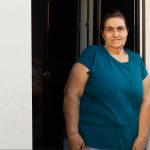Healthy Home Kits: Feliza Sulwi Chopen and Matilda Tobar
Feliza Sulwi Chopen
Outside the bustling town of San Lucas Tolimán lies a smaller, quieter community. Home to 500 families, this place, named Xejuyu (pronounced “Shay-Who-You”), is inhabited by people who speak a kaleidoscopic mixture of the Maya indigenous language, Kaqchiquel, and Spanish. Here, neighbors easily recognize one another and take care of one another’s children as if they were their own.
Feliza Sulwi Chopen, mother of two students and proud owner of a Healthy Home Kit, has lived in this community her entire life. She cares for her house while her husband, Benjamin, is away working at a major farm down the road. Since she was a girl, Feliza has used a stove to support her family. “Here in Guatemala, the stove is life,” she explains.
However, like most women in Guatemala, Feliza has used an ineffective and dangerous stove for decades. When asked about her previous device, she recalls the many issues with its construction. “Our old stove was crooked, and because of that, a lot of smoke would come out and flood the house. The smoke would also stay in the house, and it was impossible to air out our rooms when that happened.” Access to clean air was also out of the question. “The stove always affected our health; we couldn’t breathe at all inside our house.”
After receiving materials to build a new stove this past May, Feliza’s family has already witnessed several positive economic and health changes. She gives us a quick financial breakdown of how the stove has impacted her life: “Since building the stove, we have cut back a lot on paying for wood. Now, we only need a little to heat up the entire grill and to cook our food. We can put three or four pots on top and cook for the entire family. For every two pieces of wood, that’s four pots of food for a whole family.” Mostly importantly, she says, “Saving money on firewood means one more piece of bread for our children.”
Feliza also notes that the water filter and latrine have contributed to a change in routine. Rather than boiling her water, she can readily access the supply in her filter and doesn’t have to worry about falling ill from waterborne diseases. She is also pleased with her family’s latrine, which is made of stone blocks and wooden beams. “Since building the latrine, we feel happier and cleaner. The air is pure, and we have a private space where there wasn’t one before.”

Matilida Tobar
Matilda Tobar lives one house down from Feliza. While her husband works in the countryside, she is in charge of caring for her seven-year-old daughter, Paola, and the newest addition to the family, baby Brenaly. Like Feliza, she spends most of the day using a stovetop to prepare tortillas and meals for her family. Matilda is overjoyed that her new stove, which was built last May by a group of volunteers, is nothing like her old one. When remembering how the previous stove functioned, she shakes her head in disbelief.

“Our old stove was tiny! You couldn’t cook anything on it. The old kind, which almost everyone uses,
produces so much smoke and burns women and kids all the time. If you ask any of the women in this community, they can show you their scars from the burns.” In addition to the exterior risks, Matilda notes the stove’s negative impact on her family’s health. “My kids were always sick; my baby had a very bad cough for a long time, and we were always at the doctor, trying to get her help. She concludes: “Bad stoves are dangerous for everyone.”

The new stove has helped her family in many more ways than she realized. “We save a little money from not having to buy so much wood. Whatever we save, we give to our kids for school. We can buy them books, uniforms, whatever they need. Everything we do is always for our children.”



